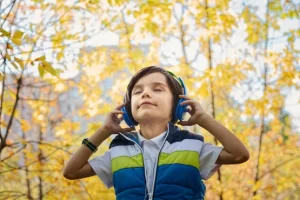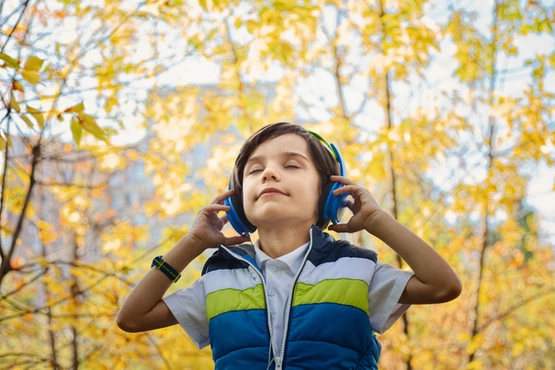Uncategorized
Relaxing Music for Children
Just like adults, children can interact with music. In fact, in the first years of a child’s life, the child adapts and constantly learns about all the sounds surrounding them.
Music has the power to change the body’s mood, and it is a non-spoken language which has the same power as a spoken language.
This article will mention different aspects that can help an infant’s corporal and mental relaxation.

Foto de jonas mohamadi de Pexels: https://www.pexels.com/es-es/foto/foto-de-un-nino-escuchando-con-auriculares-1490844/
Since early times music has been beneficial to humans and has accompanied them in daily life, from songs used to make work more enjoyable, to music created for life’s grand events such as weddings and feasts, as well as music created to be played by a soloist in front of an audience. In other words, music is always with us.
These same concepts can be attached to relaxing music for children since music can provide different benefits that help children’s mental and physical health. The music composed by W. A. Mozart, for example, is a clear example of how music interacts with the receptor, in this case, a child.
Mozart’s music was written during the 18th century, the age of Enlightenment, during which reason came before emotions, which in turn meant that the emotions were discriminated, and emotion could only be structured. This fact is most important since it can help a child’s mental development, as it’s structurally logical, balanced, and transparent music.
These are aspects that can help a child’s reasoning abilities and can even develop the organisation of a child’s spoken language. This music is structured into different motifs and phases, reflecting the same structure when we speak. Mathematically, the organisation of this music is perfection.
Calming Down with Music
When a child is irritated, the best is to let them hear peaceful and slow pieces of music, as child’s emotions need to be balanced against music in order to change the child’s state of mind. Pieces such as second movements of sonatas and concertos are effective examples. Just as second movements of instrumental music help to change a child’s mood, the timbre of a piece of music can also exert a significant influence.
It’s recommendable to play music created for wind and wood instruments, bowed and plucked string instruments, or keyboard, since the pastel colour that one perceives when hearing the sonority of such instruments
can hugely influence their mood.
Cheering Up with Music
Whilst music can calm a child’s mental state, there is also music that can cheer and enliven a child, making them jump and dance. This is good for children’s physical exercise and movement, and at the same time, for their psychological development. Lively pieces such as marches and gavottes, which appear included in large suites, can be used for this type of stimulation.
Boosting their Concentration
Incidental music can also significantly help with a child’s concentration; music that emits sounds of nature, like birds, the wind, or the sea. Clear examples would be Vivaldi’s Four Seasons, which are charged with a great range of natural elements, and is music that delivers calmness and pleasure to the listener, and encourages a heightened sense of concentration in the listener.
Impressionist composers such as Debussy and Ravel navigate within this sea of concentration. Pieces such as Debussy‘s La Mer or Arabesques are excellent examples that can be used to help a child concentrate better.
Falling Sleep with Music
Music can also help a child fall asleep, such as music that is calming and filled with harmonic and sonorous beauty.
JS Bach’s Goldberg Variations are cycles of variations that take as its main theme the magnificent Aria in G major and were composed for a German count who had difficulty sleeping. As such, they can exert the same effect on a child who may have difficulty falling asleep, since the music is essentially variations of one theme played repeatedly, much like the idea of counting sheep to help relax the mind.
Conclusion
As we can see, music can be used by a parent or carer of a child to promote a child’s concentration or sleep, help calm their mood, or cheer them up. So music can be thought of as medicine for children, and can work wonders for developing a child’s mental and physical wellbeing.
Do not miss our new post about the benefits of classical music on mental health.

